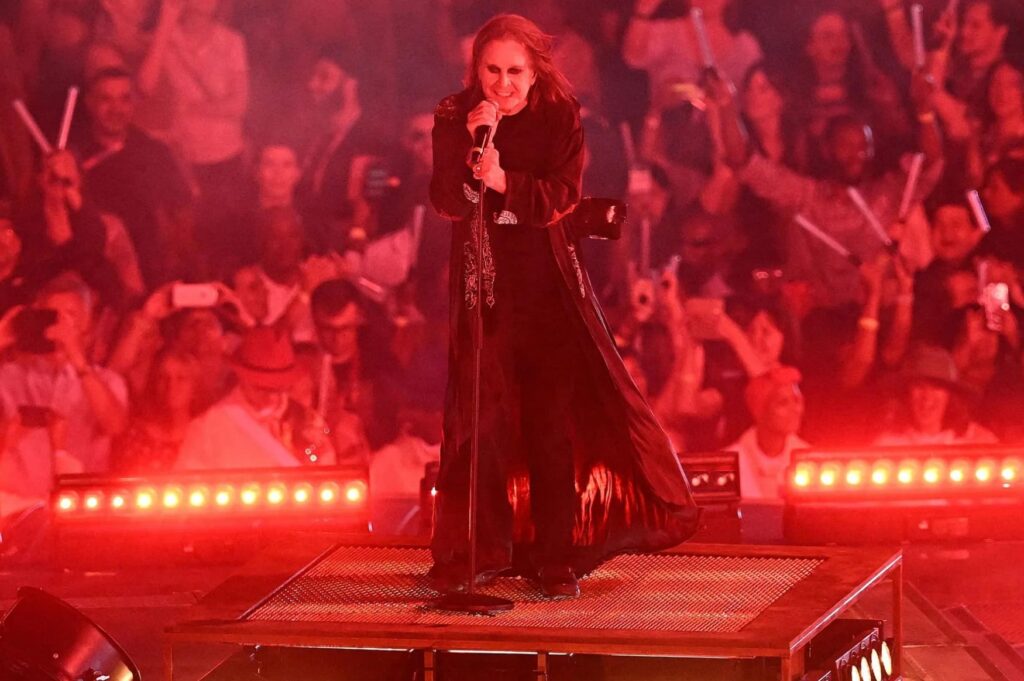Ozzy Osbourne & Tony Iommi — “Paranoid” Homecoming at the Birmingham Commonwealth Games
It began as a hometown secret and ended as a thunderclap: a surprise finale at Birmingham’s Alexander Stadium that turned a sporting ceremony into heavy-metal history. On the closing night of the 2022 Commonwealth Games, Ozzy Osbourne rose from the stage beside Tony Iommi, and the roar that met them said everything—this was Black Sabbath territory, and the kings had come home. The date was August 8, 2022, and the shock of their appearance rippled worldwide within minutes.

Before a note rang out, the symbolism was already towering. Black Sabbath was born in Birmingham in 1968, and here its most storied voices stood again, not for a tour or a festival, but to salute the city that forged them. You could feel decades of grit and invention condensed into a single reveal. It wasn’t nostalgia; it was civic electricity running straight through a stadium of locals who knew exactly what they were witnessing.
Then the tease: the metallic tolling and riff-work of “Iron Man,” a brief invocation of the band’s doom-laden canon, used like a flare to summon the storm. Seconds later, the gears kicked up and the show snapped into “Paranoid,” the sprinting anthem that first vaulted Sabbath onto the charts. The sequencing was perfect—gravitas, then ignition, a history lesson in two riffs.
The lineup underscored the intent. Tony Iommi’s guitar was a granite cliff, Ozzy took the front, with Tommy Clufetos on drums and Adam Wakeman holding down the low end and keys—the same trusted sidemen who have anchored late-era Sabbath and Ozzy tours. Nothing felt tentative. The rhythm section hit with stadium weight, and Iommi’s right hand carved the air with that dry, unstoppable chop he’s refined for half a century.
Ozzy’s first bark into the mic carried the old snap—ragged and bright, the exact alloy that made him singular. Between lines he goaded the crowd, arms windmilling like a conductor of mayhem, tossing out greetings to his hometown and compressing years of absence and struggle into one defiant welcome. If there was rust, it burned off instantly.
What gave the moment extra voltage was context. This was Ozzy’s first major public performance since 2019, after surgeries and setbacks that would have benched nearly anyone. The cameras caught a frontman pushing through with relish—less a comeback than a declaration that the fire, though weathered, still throws heat enough to light an arena.
Alexander Stadium held tens of thousands that night, and the sound of them turned the chorus into a civic chant. The Games had celebrated athletic endurance all week; now Birmingham celebrated cultural endurance—music born on these streets that rewired rock around the world. The lights fanned, the crowd yelled every word, and you could see faces laughing as they sang; they were in on a punchline that never gets old.
Iommi’s tone—surgical midrange, ironclad sustain—kept the song from drifting into tribute-band sheen. Every downstroke sounded like a verdict. When he locked with Clufetos on the breaks, it was the old Sabbath physics lesson: groove as gravity, shock as release. Wakeman’s low-end pulse made the riff feel wider than the field itself, glueing the stadium beat to the band’s engine.
Ozzy, meanwhile, played master of ceremonies as much as singer, pacing the front lip, rallying call-and-responses, and holding notes just long enough to let the choir of Brummies finish the line. The voice carried road wear, yes, but it also carried that gleeful menace—half grin, half snarl—that makes his delivery feel like a party you’re slightly scared to miss.
The staging cut through the night like an exclamation point. Fireworks flecked the sky, cameras swung to the stands, and for an ecstatic minute the Commonwealth’s closing ceremony looked like a metal festival. It wasn’t a long set—no need. A taste of “Iron Man” and a punchy “Paranoid” were all it took to brand the city’s soundtrack onto a global broadcast.
What you remember later are tiny details: Ozzy’s grin when the first line landed back from the crowd; Iommi’s sideways glance across the stage during the final chorus; the way the outro shook loose into applause before the last chord stopped vibrating. Little human signals that this wasn’t a museum piece—it was alive, and it knew exactly where it was.
When the last hit slammed down, Ozzy emptied the tank on his farewell to the city. That final salute felt like the intended epitaph for the moment: not a curtain call so much as a stamp on a legacy that long ago outgrew venues and years. The stadium answered with a noise you feel in your ribs.
In the hours that followed, clips flew across timelines and headlines framed the moment the way fans already had: a triumphant homecoming and a jolt of proof that legends can still materialize without warning, do the thing only they can do, and vanish leaving bigger echoes than the fireworks. Birmingham glowed a little brighter on the global rock map again.
If you measure performances by set length, this was small. If you measure them by cultural density, it was seismic. One city, two riffs, four veterans, and a song that helped ignite an entire genre—reintroduced not as nostalgia, but as living heritage. In a week devoted to medals, this was the night’s other podium, the one no scoreboard could tally.
And that’s why the clip still hits on replay. It condenses more than fifty years of invention into a few electrified minutes and hands it back to the neighborhood that started it all. You don’t need commentary to understand it. You can hear the story in the first chord and see the ending in the smiles: Birmingham gave the world Sabbath; Sabbath came home and gave Birmingham a memory that will outlast the stadium lights.





